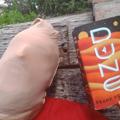Ner reviewed Kim Ji-young, nacida en 1982 by Cho Nam-joo
None
5 stars
5⭐⭐⭐⭐⭐
Este libro puede descubrirte cómo actúa el sistema patriarcal directamente en nuestras vidas sin tan siquiera haber nacido, amoldándonos a unos estándares que nos perjudican, amueblándonos la cabeza para que sea prácticamente imposible salir de esas dinámicas o, por el contrario, puede no decirte nada nuevo porque ya tienes el suficiente bagaje con estas lectura, con este mundo cruel que se esfuerza sistemáticamente por complicarnos la existencia. Aun así, e independientemente de cuál de estas dos situaciones sea la tuya, lo que está claro es que en todo momento te morderás la lengua de la rabia, pondrás los ojos en blanco ante la cantidad de tonterías que se pueden verter en nuestras mentes y, sobre todo, sentirás una pena anorme ante esta protagonista porque no podrás evitar pensar: "Podría ser yo, mi madre, mi hermana, mi vecina, o aquella desconocida con la que choqué en el sueprmercado."
5⭐⭐⭐⭐⭐
Este libro puede descubrirte cómo actúa el sistema patriarcal directamente en nuestras vidas sin tan siquiera haber nacido, amoldándonos a unos estándares que nos perjudican, amueblándonos la cabeza para que sea prácticamente imposible salir de esas dinámicas o, por el contrario, puede no decirte nada nuevo porque ya tienes el suficiente bagaje con estas lectura, con este mundo cruel que se esfuerza sistemáticamente por complicarnos la existencia. Aun así, e independientemente de cuál de estas dos situaciones sea la tuya, lo que está claro es que en todo momento te morderás la lengua de la rabia, pondrás los ojos en blanco ante la cantidad de tonterías que se pueden verter en nuestras mentes y, sobre todo, sentirás una pena anorme ante esta protagonista porque no podrás evitar pensar: "Podría ser yo, mi madre, mi hermana, mi vecina, o aquella desconocida con la que choqué en el sueprmercado."









